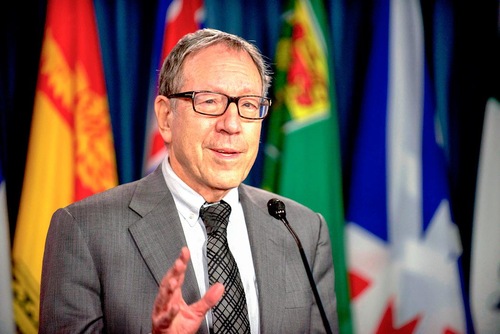Former Canadian Minister of Justice: “Trade and Human Rights Must Be Complementary and Not Contradictory”
(Minghui.org) At a press conference held at the Canadian Parliament Hill on December 9, Irwin Cotler, former Canadian Minister of Justice, Attorney General, and Parliament Member, pointed out that the Chinese Communist Party's culture of impunity underpins the persecution of Falun Gong in China. He believes that as long as the persecution continues, “the Chinese authorities will continue to be on the wrong side of history.”
 Irwin Cotler, former Canadian Minister of Justice, Attorney General, and Parliament Member, at a press conference held at the Canadian Parliament Hill on December 9.
Irwin Cotler, former Canadian Minister of Justice, Attorney General, and Parliament Member, at a press conference held at the Canadian Parliament Hill on December 9.
“A culture of impunity”
Cotler said, “[The Chinese authorities] have to take steps to combat a culture of impunity.” He believes that so long as the culture of impunity continues, the regime will “[participate in] the forced and illegal organ harvesting,” “underpin the persecution and prosecution of Falun Gong practitioners,” and find “expression in the increasing arrest and prosecution of citizen advocacy groups, of human rights defenders, of lawyers, of those involved in trying to push forward the very process that the authorities say they are committed to.”
Colter added, “When there is an attempt to put that process and advance it forward, they find themselves criminalized. Then we're seeing, along with this addressing a culture of corruption, the ongoing culture of impunity, which I said underpins persecution and prosecution.”
He said, “For the Chinese authorities to show that they are serious about the question of reform, that they are serious about combating the culture of corruption, that they are serious about introducing and maintaining the rule of law, in all fronts is to begin by ceasing and desisting from the persecution and prosecution of Falun Gong practitioners, and to allow those who are imprisoned with their Canadian relatives here in Canada to be released. That will be the test whether the authorities have indeed embarked on a new path.”
“The question of their treatment of the Falun Gong will be a litmus test of how they are going forward in an authentic way and fulfilling their commitments.”
Persecution Victims File Charges Against Former Chinese Leader
Two victims of the persecution spoke at the press conference.
Paul Li, a Canadian citizen, called for help to rescue his father Li Xiaobo, who was sentenced to eight years in prison in 2005 for practicing Falun Gong. In May 2015, he was arrested again for passing out information about the persecution of Falun Gong and sentenced to another eight years.
According to Paul Li, his father has been tortured in Jiazhou prison, and his aunt has also been physically tortured in a brainwashing center for practicing Falun Gong.
Paul Li filed a criminal complaint against former Chinese leader Jiang Zemin for launching and directing the persecution. At the press conference, Li called for more attention from the international community to the recent flood of criminal complaints filed against Jiang by nearly 200,000 Falun Gong practitioners.
Hope Chen, a Falun Gong practitioner from Toronto, told the press that her father Chen Yongbo, who filed a complaint against Jiang in August and was arrested in November at his workplace. He was then taken to a brainwashing center, where authorities coerce practitioners to renounce their belief, often through torture.
“Stand in solidarity”
Cotler praised Li and Chen for their courage and “for giving expression to these fundamental values of truth and compassion and tolerance.”
He believes that, as Canadian parliamentarians and Canadian citizens, “It is our responsibility to stand in solidarity with them, to stand in solidarity with all those who are persecuted in prison, to let them know that they are not alone.”
Cotler said to the Canadian government and parliamentarians, “We are under the threshold of a possible breakthrough moment in China and in our relationship with China. If we stay steadfast to our principles and to our commitments, if we say that the narrative of our relationship must be one that is inspired by a commitment to the rule of law as well as a commitment to trade and investment, by a commitment to democracy as well as a commitment to our commercial relationships, that trade and human rights must be complementary and not contradictory. You can't have one without the other.”